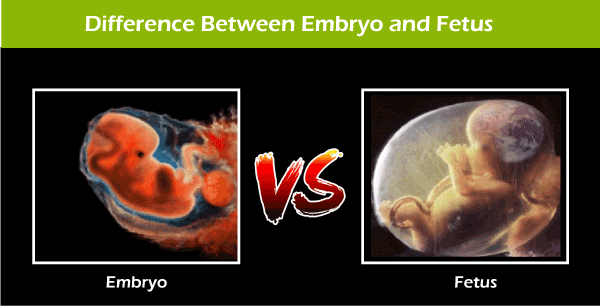Difference between Embryo and FetusThe human body is a complex mechanism that comprises of cells, veins, muscles, systems, etc. The body reacts to everything that goes in it. Every cell of the body rejuvenates or destroys based on the lifestyle of a person. That is why we are always advised to adopt a healthy lifestyle so that diseases and disorders do not attack us. Now, eating healthy is the primary thing that one has to keep in mind while adapting to a healthy lifestyle. Right food balances the body in a certain way. Whenever we are ill or are suffering from any disorder, we are always suggested to eat healthy food. The same goes for pregnancy. A pregnant woman is advised to take care of her diet and do yoga daily. One has to adopt a healthy lifestyle for a healthy baby. So today, we will be discussing about the two main terms related to this, i.e., embryo and fetus. Both are related to the fertilization process and the after weeks. There are some specific differences between them, but let us begin with the meanings of these two terms. 
EmbryoAn embryo is defined as the stage of development for an unborn offspring during the weeks (generally 2-8 weeks) of fertilization. An embryo is a very early stage of development for the child in the womb. This stage begins after the fertilization process, which continues to structure the child's body, like organs, tissues, body parts, etc. In biology, an embryo is defined as the organism in the early developmental stage, hatching from an egg. The fetal growth is seen after the conception. Now, it is interesting to note that a fertilized egg that has started the cell division is called the pre-embryo stage. An embryo is able to move its neck and back. However, this can be clearly seen by ultrasound after six to seven weeks of conception. The heartbeat of an embryo begins around six weeks. Now, you must be wondering as to how an embryo is formed? Well, the placenta cells create an outer layer of membranes around the blastocyst. The other cells begin to develop a sac, and when the sac is fully created, the blastocyst is called an embryo. This is how an embryo is formed. The age of an embryo ranges from 10 weeks to 13 weeks (0-6 days). Human embryonic development comprises of several stages like the germinal stage, fertilization, blastulation, implantation, gastrulation, neurulation, development of organs, etc. All these stages combine to form an embryo. FetusA fetus is defined as a later stage wherein the unborn child develops after eight weeks of conception. The fetus develops from an embryo. After embryonic development, the development of the fetus takes place. This stage begins from the ninth week and continues till the birth of the child. A fetus has a heartbeat as it develops at an early stage. The range of the heartbeat is 90-110 bpm. It increases from the ninth week and reaches 140-170 bpm. Now, let us discuss about the size of the fetus. After the third month, the child is 3-4 inches long and weighs for about one ounce. The critical development of a child takes place in the first three months. Thus, the chances of miscarriages reduce after the third month. The fetus in the womb does breathing-like movements. These movements are necessary for the development of the lungs. The heart, lungs, brain, and several other organs are developed through these breathing movements. Well, these movements are felt after 21 weeks. After the fifth month, the size of the fetus reaches 8 inches. Now, there are several contrasting points between an embryo and a fetus. So, let us take a look at them.
So, these are some of the contrasting points between an embryo and a fetus. The development of the body takes place in these two stages. Now, there are certain characteristics associated with the embryo and fetus. So, let us take a look at them. Characteristics of Embryo & Fetus
So, these are some of the characteristics regarding the embryo and fetus. Both are the stages leading to the development of the baby. The child grows through the weeks, developing the organs, tissues, parts, etc. Thus, both embryo and fetus are the stages experienced by women after conception, which results in the baby's growth.
Next TopicDifference between
|
 For Videos Join Our Youtube Channel: Join Now
For Videos Join Our Youtube Channel: Join Now
Feedback
- Send your Feedback to [email protected]
Help Others, Please Share










